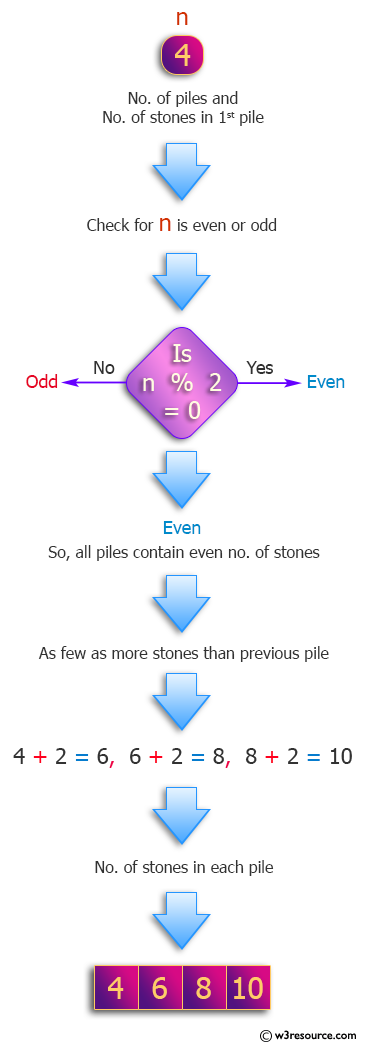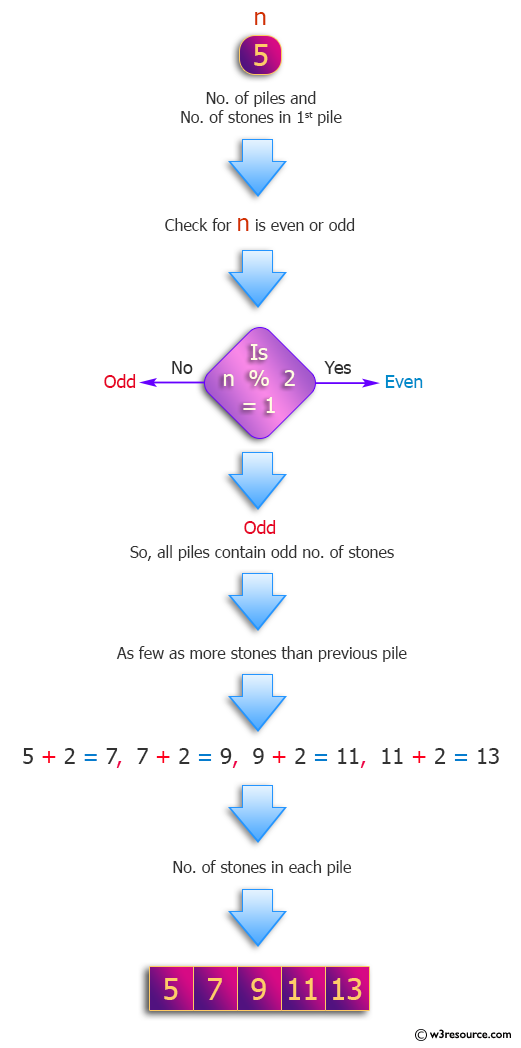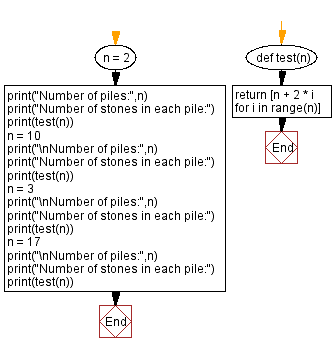Python: Find the number of stones in each pile
Stone Piles Distribution
We are making n stone piles! The first pile has n stones. If n is even, then all piles have an even number of stones. If n is odd, all piles have an odd number of stones. Each pile must more stones than the previous pile but as few as possible. Write a Python program to find the number of stones in each pile.
Input: 2 Output: [2, 4] Input: 10 Output: [10, 12, 14, 16, 18, 20, 22, 24, 26, 28] Input: 3 Output: [3, 5, 7] Input: 17 Output: [17, 19, 21, 23, 25, 27, 29, 31, 33, 35, 37, 39, 41, 43, 45, 47, 49]
Visual Presentation:


Sample Solution:
Python Code:
# License: https://bit.ly/3oLErEI
# Define a function named 'test' that takes an integer 'n' as input
def test(n):
# Use a list comprehension to generate a list of values: n + 2 * i for i in the range from 0 to n-1
return [n + 2 * i for i in range(n)]
# Assign a specific integer 'n' to the variable
n = 2
# Print the number of piles
print("Number of piles:", n)
# Print the header for the output
print("Number of stones in each pile:")
# Print the result of the test function applied to the integer 'n'
print(test(n))
# Assign a different integer 'n' to the variable
n = 10
# Print the number of piles
print("\nNumber of piles:", n)
# Print the header for the output
print("Number of stones in each pile:")
# Print the result of the test function applied to the modified integer 'n'
print(test(n))
# Assign another integer 'n' to the variable
n = 3
# Print the number of piles
print("\nNumber of piles:", n)
# Print the header for the output
print("Number of stones in each pile:")
# Print the result of the test function applied to the modified integer 'n'
print(test(n))
# Assign yet another integer 'n' to the variable
n = 17
# Print the number of piles
print("\nNumber of piles:", n)
# Print the header for the output
print("Number of stones in each pile:")
# Print the result of the test function applied to the modified integer 'n'
print(test(n))
Sample Output:
Number of piles: 2 Number of stones in each pile: [2, 4] Number of piles: 10 Number of stones in each pile: [10, 12, 14, 16, 18, 20, 22, 24, 26, 28] Number of piles: 3 Number of stones in each pile: [3, 5, 7] Number of piles: 17 Number of stones in each pile: [17, 19, 21, 23, 25, 27, 29, 31, 33, 35, 37, 39
Flowchart:

For more Practice: Solve these Related Problems:
- Write a Python program that, given an integer n, outputs a list of n stone piles starting at n and increasing by 2 if n is odd or by 2 if n is even.
- Write a Python program to generate n stone piles where each pile has the minimal number of stones greater than the previous one, maintaining parity with the first pile.
- Write a Python program to compute the sequence of stone piles where if n is even all piles are even, and if n is odd all piles are odd, with each subsequent pile incremented by 2.
- Write a Python program that verifies the condition by generating a list of n piles starting from n and ensuring the difference between consecutive piles is exactly 2.
Go to:
Previous: Whether an integer greater than 4^4 which is 4 mod 34.
Next: Check the nth-1 string is a proper substring of nth string of a given list of strings.
Python Code Editor :
Have another way to solve this solution? Contribute your code (and comments) through Disqus.
What is the difficulty level of this exercise?
Test your Programming skills with w3resource's quiz.
